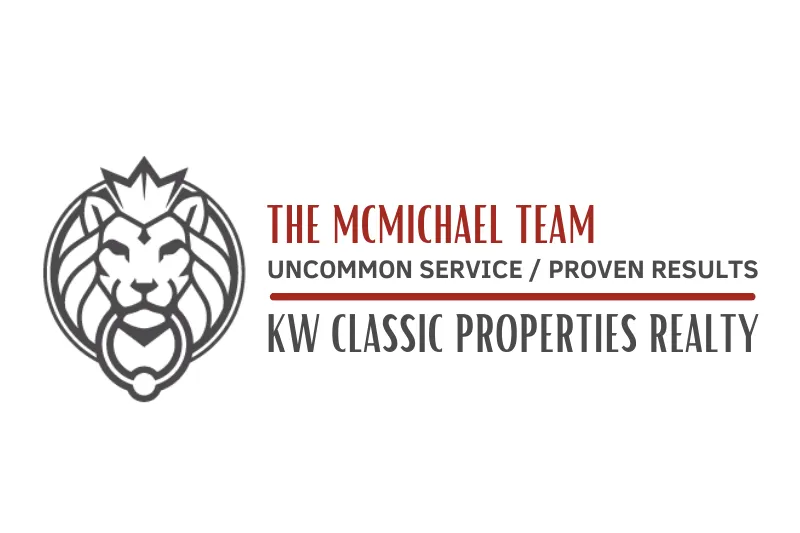Sell Your Columbus,Ohio Home Quickly With The McMichael Team
Join tons of highly satisfied homeowners who have worked with The McMicheal Team to sell their home quickly and for top dollar.
or call us at (614) 766-7766 today!
Are you ready to sell your house? Fill out this simple form or call (614) 769-7766.
Know Why You are Selling
If you know exactly why you are selling then it is easier for you to follow the right plan of action for getting what you want.
If you are a seller who needs to close a sale as quickly as possible, then you should know that getting the highest price possible is not one of your priorities. It does not mean that you won’t or cannot get the highest price, but it means that the price is not the deciding factor.
A buyer who can give you a quick closing time will appeal much more to you than a buyer who can offer you more money but the negotiation and closing time drag on.
It’s always good to know how low you will go, in terms of selling price. This will help to eliminate some of the offers that you find simply offensive or ridiculous. Even though you should consider all offers seriously and take into consideration the terms of each offer, sometimes, if you know the bottom line and are strict about it, you can save yourself time.
Once you know what your limits and reasons are, discuss them with your agent so that they can help you set your goals realistically. If you decide to list your home on your own, make sure you do research on the current market, and you get the proper advice you need in terms of legal issues, etc. The key is to be realistic and to know what your goals are so they can be met.
Plan of Action
- Analyze why you are selling – If you understand your motives, you will be able to better negotiate and to get what it is that you want, whether it be a quick sale, high price, or somewhere in the middle.
- Prepare your home for the buyer – Maximize the strengths of your property and fix up its weaknesses. You want the buyer to walk away from your home with a lasting good impression.
- Find a good real estate agent that understands your needs – Make sure that your agent is loyal to you, and can negotiate to help you achieve your goals. In addition, they should be assertive and honest with both you and the buyer.
- Be prepared for negotiation – Learn and understand your buyer’s situation; what are their motives? Can you demand a big deposit from them? Try to lock in the buyer so that the deal goes through.
- Negotiate for the best price and the best terms – Learn how to counter offer to get maximum value from every offer.
- Make sure the contract is accurate and complete – Be honest with your disclosures; you do not want to lose the deal because you were lying or diminishing your home’s defects. Insist the buyers get a professional inspection. This will protect both you and the buyer.
Finding the Right Agent
Not all agents work the same way. The most important attribute of an agent is that he/she is well connected to the real estate industry. He/she should know the market and provide information on past sales, current listings, his or her marketing plan, and at least 4 solid references. In addition, you also want to look for an agent that is honest, assertive, and one that best understands your needs.
Try to go with a local agent. They can better serve your needs because they should be more familiar with the local market conditions, local prices, and what’s hot or not in your community.
Considering Offers
When reading an offer, keep in mind that you are out to get the best price AND the best terms for you. If you focus solely on the price, you may overlook terms that could be favorable to you as a seller.
Some terms that may work in your favor:
higher-than-market-interest in a second mortgage for your home
the buyer will pay for most or all of the closing costs
the buyer will take care of any repairs
quick close – the buyer is pre-approved, ready to close in a timeframe that best suits you
all-cash deal
When reading through offers, remember to look at the whole package. Take the time that you need to assess what is being offered and if it meets your needs.
Setting the Price
The price is the first thing buyers notice about your property. If you set your price too high, then the chance of alienating buyers is higher. You want your house to be taken seriously, and the asking price reflects how serious you are about selling your home.
Several factors will contribute to your final decision. First, you should compare your house to others that are in the market. If you use an agent, he/she will provide you with a CMA (Comparative Market Analysis). The CMA will reflect the following:
houses in your price range and area that were sold within the last half-year
asking and selling prices of houses
current inventory of houses on the market
features of each house on the market
For Sale By Owner – A Good Idea?
FSBO (pronounced fizz-bo), or For Sale By Owner, is a way of selling your home without the use of a professional real estate agent or broker. The idea behind FSBO is that by selling your home yourself, you save the approximate 6% that would be the agents’ commission.
6% may not sound like a lot, but it can add up, especially on more expensive homes. But before you run off and decide to sell your home FSBO, you must remember that to get savings like that, there must be a cost. So what’s the catch? Selling FSBO is hard. A lot harder.
Only about 10% of sellers that decide to do FSBO are successful at it. And not all of them end up saving themselves money. FSBO sellers often end up accepting a lower price for their home than they would with an agent.
There are of course other issues as well. Can you afford to make selling your home your full-time job? Because for a lot of FSBO sellers, that’s exactly what it is. Do you have the time and capital to spend on the marketing, advertising, inspections, paperwork, phone calls, showings, and problems that come up when any home is sold?
Selling with a professional agent also has other advantages. An agent can get your home listed on the MLS (Multiple Listing Service) and other popular websites where not only homebuyers but also other agents can easily find it. Professional real estate agents also have an extensive network that allows them to more easily find a buyer.
So before you decide to sell your home yourself, thoughtfully consider just how much time and effort you can spare for selling your home, as well as how important it is that your home sell sooner rather than later.
Recent Posts

Get Ready to Buy a Home by Improving Your Credit Score
“Your credit score is a measure of your financial trustworthiness, so handle it with care.” - Gail Cunningham
Introduction:
Buying a home is a significant milestone in life, but it often comes with a big financial commitment. That's where your credit score becomes a crucial player. A good credit score can make the difference between your homeownership dreams coming true or falling flat. In this article, we'll explore the world of credit scores, why they matter when buying a home, and how you can take steps to improve your credit score and prepare for homeownership.

A good credit score can make the difference between your homeownership dreams coming true or falling flat.
Understanding Credit Scores
Before we dive into the specifics of credit scores and homebuying, let's clarify what a credit score actually is. Your credit score is a three-digit number that reflects your creditworthiness and is used by lenders to assess the risk of lending to you. It's typically calculated based on your credit history, including factors such as your payment history, credit utilization, length of credit history, and types of credit accounts.
Why a Good Credit Score Matters
Why is a good credit score so crucial when it comes to buying a home? The answer lies in how lenders perceive risk. When you apply for a mortgage, lenders use your credit score to determine whether to approve your application and what interest rate to offer. A higher credit score usually translates to a lower interest rate and more favorable loan terms. In other words, a good credit score can save you a substantial amount of money over the life of your mortgage.
Assessing Your Current Credit Score
The first step on your journey to improving your credit score is understanding where you currently stand. You can check your credit score for free from various online sources or through your credit card company. Additionally, you're entitled to one free credit report from each of the three major credit bureaus—Equifax, Experian, and TransUnion—every 12 months through AnnualCreditReport.com. Review your credit report thoroughly to ensure accuracy and identify any negative items that might be dragging down your score.
Factors That Affect Your Credit Score
To improve your credit score, it's essential to understand the factors that influence it. These include your payment history (whether you pay your bills on time), credit utilization (how much of your available credit you use), the length of your credit history, the types of credit accounts you have, and any recent credit inquiries. Managing your credit cards, loans, and other financial obligations responsibly is key to boosting your score.
Creating a Credit Improvement Plan
Once you've assessed your credit score and identified areas for improvement, it's time to create a credit improvement plan. This plan may include steps like paying down high credit card balances, disputing errors on your credit report, and establishing a consistent pattern of on-time payments. It's essential to be patient and persistent as you work toward your goal of a higher credit score.
The Time Frame for Improvement
Improving your credit score is not an overnight process. It takes time, and the timeline can vary depending on the extent of the issues you need to address. Typically, it may take several months to see significant improvements. Set realistic expectations and stay committed to your credit improvement plan.
Monitoring Your Progress
As you work on improving your credit score, it's crucial to monitor your progress regularly. You can use free credit monitoring services to keep an eye on changes in your score and track your improvement. These services can also alert you to any suspicious activity on your credit report.
Seeking Professional Help
If you're struggling to make progress on your own, don't hesitate to seek professional help. Credit counseling agencies can provide guidance on managing your debts and improving your credit score. Additionally, credit repair services can assist in disputing inaccuracies on your credit report.
Benefits of a Higher Credit Score
A higher credit score brings several benefits when it comes to buying a home. It increases your chances of mortgage approval, allows you to qualify for lower interest rates, and can even lead to more favorable loan terms. These advantages can save you a significant amount of money over the life of your mortgage.
Getting Pre-Approved for a Mortgage
Once you've made progress in improving your credit score, consider getting pre-approved for a mortgage. Mortgage pre-approval not only gives you a clear picture of your budget but also signals to sellers that you're a serious buyer. A higher credit score can lead to better pre-approval terms, putting you in a stronger position when negotiating the purchase of your future home.
The Homebuying Process
With an improved credit score and mortgage pre-approval in hand, you're ready to dive into the homebuying process. This typically involves steps like searching for the right property, making an offer, and going through inspections and closing. Your real estate agent and lender will guide you through this exciting journey.
Conclusion
In conclusion, improving your credit score is a crucial step in preparing to buy a home. A higher credit score opens doors to better mortgage terms and more affordable homeownership. It's a journey that takes time and effort, but the rewards are well worth it. As you work on your credit, keep your eyes on the prize—a place to call your own.
FAQs
1. How often should I check my credit score?
It's a good practice to check your credit score at least once a year. You can do so for free through various online services.
2. Can I buy a home with bad credit?
While it's possible to buy a home with bad credit, it can be more challenging and costly. Improving your credit score is advisable for better homebuying opportunities.
3. Are there quick fixes to improve my credit score?
Beware of quick-fix solutions that promise to boost your credit score overnight. Genuine improvement takes time and responsible financial management.
4. Will improving my credit score affect my existing debts?
Improving your credit score can positively impact your existing debts by potentially lowering interest rates and making it easier to manage your financial obligations.
5. What is a good credit score for buying a home?
While specific requirements vary by lender and loan type, a FICO credit score of 700 or above is generally considered good for obtaining favorable mortgage terms.
Getting the Highest Price in the Shortest Time
In order to get the highest price in the shortest time, you need to know how to market your home. The better you market your home, the more offers you will get. And the more offers you get, the more choices you have to get the price and terms you want.
The most important factor of marketing your home is pricing it right. Your price should be adjusted to reflect the market and your property’s worth. The key is to get as many people as possible checking out your fairly priced property. If your property is not priced fairly, there will be no buyers because your price is set too high.
Another important factor is the condition of your home. Make sure that your home looks ready to be sold. Fix any defects (peeling or faded paint, cracks, stains, etc.) Condition alone can sometimes prompt fast buying decisions. Not only should you fix any defects, but consider upgrading your home by making major repairs and cosmetic improvements before selling. A nice looking home triggers the emotional response that can lead to a financial response.
Learn how to negotiate the best terms for all parties involved. Terms are another factor that may be adjusted to attract buyers. If you insist on getting your asking price, think of what you can offer to the buyers. For example, improvements you’ve made or even offering seller financing at a lower than market interest rate on a portion of the sale price. Convince them why they should be paying the price you have set.
Lastly, get the buzz out about your home. List your house with a hot agent that ensures your house is listed on the MLS and on the Internet. On your own, get the word out. It should always be visible to passersby that your house is for sale, whether it is through signs, local advertisements or you telling friends, family, and acquaintances.

1349 W. Lane Ave, Suite 1125, Columbus, OH, 43221
(614) 769-7766
(614) 768-6531
www.livingincolumbus.com





